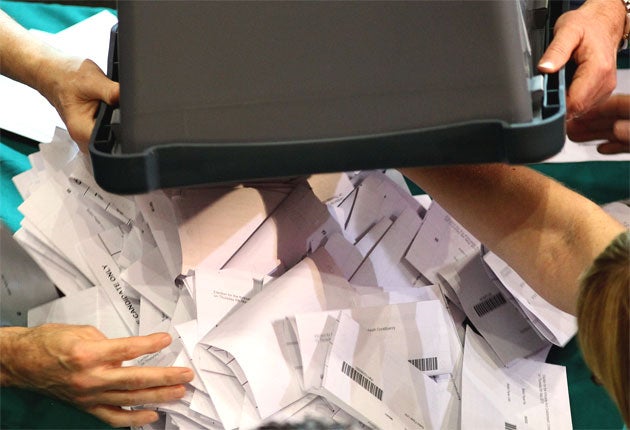Fraud crackdown could wipe millions from the electoral roll
Critics worry move could disenfranchise poorer voters

Your support helps us to tell the story
From reproductive rights to climate change to Big Tech, The Independent is on the ground when the story is developing. Whether it's investigating the financials of Elon Musk's pro-Trump PAC or producing our latest documentary, 'The A Word', which shines a light on the American women fighting for reproductive rights, we know how important it is to parse out the facts from the messaging.
At such a critical moment in US history, we need reporters on the ground. Your donation allows us to keep sending journalists to speak to both sides of the story.
The Independent is trusted by Americans across the entire political spectrum. And unlike many other quality news outlets, we choose not to lock Americans out of our reporting and analysis with paywalls. We believe quality journalism should be available to everyone, paid for by those who can afford it.
Your support makes all the difference.Millions of Britons could be unable to vote in future elections as a consequence of the Government’s crackdown on electoral fraud.
Under new rules pushed through by the Coalition, individuals are no longer allowed to register other people in their household. Parents cannot sign up their adult children and every member of a shared house has to add themselves individually to the electoral roll.
The rules were tightened because of the pressing need to combat postal vote fraud but there are now concerns that they could exacerbate the problem of low voter registration, particularly in constituencies with high student and ethnic-minority populations.
The Electoral Commission found that in some areas with a high density of young adults, less than 20 per cent of the electorate was properly registered.
This effect is most marked in student hotspots, where young people living in halls of residence were previously signed up by their university. Students are also less likely to be picked up by other means such as the council tax database.
People living in private rented housing or house shares, frail older people who may require help to sign up, and those from minority communities may also miss out.
Those who move house frequently – who are more likely to be poor – are also most likely to fall off the electoral roll.
In an attempt to address the problem, parliament has agreed to roll over the previous electoral register for next year’s general election in the hope of including most of those who have failed to sign up.
However, the 2010 register, which will be used to plug the gaps, is already missing 7.5 million people and more will drop off as communities move. When the electoral register is cleaned up to include only individual registrations, which is scheduled to happen by 2016, up to 5 million more names could be lost.
Chris Ruane, Labour MP for Vale of Clwyd, said: “Those people who are already left off are already economically and socially marginalised and now they’re politically marginalised. This is going to go from bad to worse if the government makes a decision to take an additional 5.5 million off.”
Graham Allen, Labour MP for Nottingham North and a pro-democracy campaigner, said: “I’m deeply concerned that there are 7m individuals who are not registered and that figure could go up, with more people disenfranchised when there is already a degree of cynicism about politics. It could be a further dangerous blow to the democratic political system.”
A spokesperson for the Electoral Commission said: “We are closely monitoring the transition to individual electoral registration. There’s still more work to do but it’s important to remember that no one will come off the electoral register because of this change before 2015.”
A Cabinet Office spokesman said: “Nearly 90 per cent of electors in England and Wales have been automatically transferred to the new system. Everyone else is being contacted directly and encouraged to use the new online registration system which will help maximise the number of people on the register.”
Join our commenting forum
Join thought-provoking conversations, follow other Independent readers and see their replies
Comments